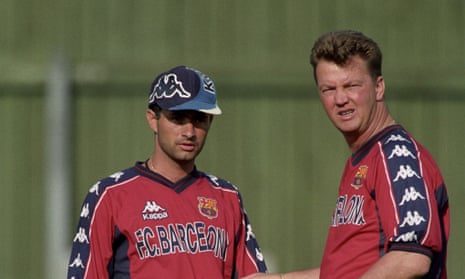Shortly before the 2010 Champions League final between Internazionale and Bayern Munich, José Mourinho sent his opposite number, Louis van Gaal, a text message that read: “A big hug before the final a big hug after the final.” Yes, that José Mourinho. Well, it’s better than a poke in the eye. That match at the Bernabéu was the only previous time Mourinho and Van Gaal have met on opposite sides in a competitive match, as they will again when Manchester United play Chelsea at Old Trafford on Sunday. It is a fixture that has for nine of the past 10 seasons been cast as a collision of title hopefuls but that this season is, from a certain angle, just as significant as a meeting of two unusually intimate managerial grandees.
There is of course a famous coaching confluence at work here, a re-entwining of two of the most significant offshoots of European football’s own mid-1990s Bloomsbury set. The Van Gaal era at Barcelona also featured Mourinho as assistant coach, Pep Guardiola as club captain and the managers of Barça, PSV Eindhoven and Ajax – Luis Enrique, Phillip Cocu and Frank de Boer – as fellow members of the playing staff.
This kind of clustered progression is a common enough phenomenon, not least where a team has been built around a galvanising philosophy. Barcelona continue to burp out managers, and no doubt 10 years from now elite level European football will be directed by the post-Pep brigade: Generation Lahm, the Busquets Set. What is unusual is the degree of enduring affection that still exists between Van Gaal and Mourinho almost 15 years on from the end of their three-year working relationship, a period when Mourinho was granted an unplanned but gloriously lucid coaching apprenticeship.
“He was a little bit arrogant, not always a respecter of reputations,” Van Gaal has said of those early days at Barcelona. “I sometimes think I was the only guy who believed in José,” United’s manager suggested in Patrick Barclay’s excellent book Mourinho. “He was known as El Traductor [the Translator] … I took him more seriously than most people in the club.”
Certainly there is a case to be made that the guarded but still tangible sense of affection between the two has something to do with that degree of professional distance.
“We were never in the same league,” Mourinho said during his pre-match press conference at Cobham. “In the Champions League you depend on draws and it happened only once. But that’s not important. What is important is [Sunday]. I don’t play against Louis. Chelsea plays Manchester United and during the match I have no time and for sure he has no time to look around and to see who the opponent’s manager is. Before the match and after the match he is one of my big friends in football and I will be always happy to see him.”
For a man whose later interactions with Barcelona have often been troubled, Mourinho remains unequivocal about his time with Van Gaal in Catalonia, a period in which he was initially angry at Bobby Robson being shunting aside but persuaded to stay by Van Gaal and promoted thereafter from Mr Fix-it to analyst, assistant coach and – for the odd friendly – de facto first‑team manager.
“To be working four years, one with Mr Robson and three with Louis in a club like Barcelona was very important,” Mourinho said. “If I have to choose important people in my career for sure he’s one of them. I never hid the fact he is my friend and the respect I have for him.”
It is hard to overstate this professional influence: in a sense Van Gaal made Mourinho. Certainly he was the first to give his near neighbour – they lived in the same building and would often share meals, family birthdays and late night tactical chats – any real coaching experience. Under Robson, Mourinho had been a high-grade gopher. Under Van Gaal he received a total education in systems and structures, becoming in a sense another successful Van Gaal hunch, a punt on youth, in his own time a kind of back-room Tyler Blackett.
Not that Mourinho was in the mood to expand on his debt to Van Gaal. Naturally enough his thoughts are more closelyoccupied with the fitness of his forwards, with Loïc Rémy out for two or three weeks and Diego Costa struggling to start at Old Trafford after a week that saw his familiar hamstring struggles compounded by a trip to hospital with a gastric virus. Mourinho still has some hope Costa will play ahead of Didier Drogba, who looked ponderous against Maribor in midweek.
Without Costa, Sunday’s match resembles, from a certain angle, a meeting of two halves of a pantomime horse: the team with no strikers against the team without a defence.
Van Gaal may have inherited a decomposing cadaver of a champion team, his bits and pieces midfield and defence thrown into alarming relief by Chelsea’s well-calibrated spine. But United do have a point of strength at centre-forward: Radamel Falcao, Robin van Persie and Wayne Rooney trump Costa, Rémy and Drogba, while in Ángel di María United have one creative midfielder to match anything in Chelsea’s own battery. The Argentinian is of course a player Mourinho also knows well from his second spell in Spain.
“If I bought Di María it was because I liked him,” Mourinho said. “If he was fantastic in my period at Real Madrid, good. Now he is at Manchester, a little like Louis there are fantastic memories but over 90 minutes he wants to win and I want to win.”

